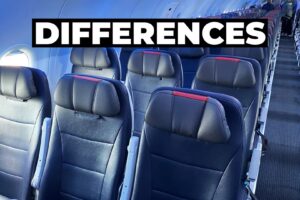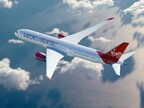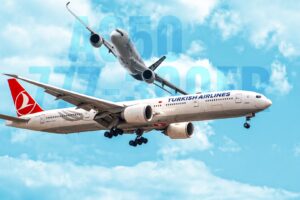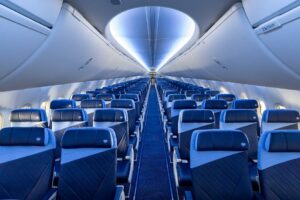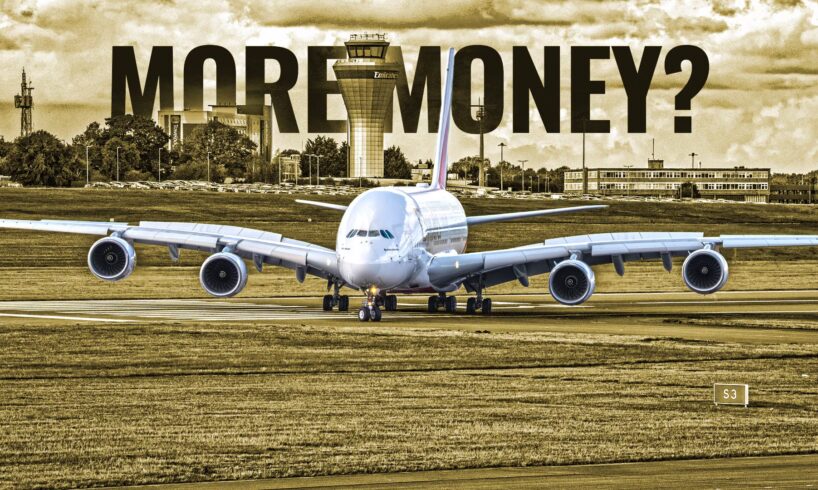
Everything feels like it is getting more expensive this year. Inflation in the US currently sits at 3% and is even higher in much of the world. No industry can escape this phenomenon, including the cost of flying.
Read this article to learn about the direction that air fares are going in. We also cover the latest trends that could push prices even higher for certain passengers, including the introduction of artificial intelligence into ticket pricing and higher “single supplement” fares for solo travelers.
Have Airfares Gone Up?
Credit: Wikimedia Commons
NerdWallet has gathered data to answer whether everyone’s suspicions are true, and airfares have gone up over the past year. Their data reveals a mixed picture. An increase of 2.8% from August to September this year, and an increase of 3.2% over the past year, would suggest they are rising at a similar rate to inflation. However, this goes in a different direction from the last decade, which has seen the cost of flying fall by 6.1%. The table below shows the NerdWallet data for the cost of flying:
Period
Change
September 2025 vs August 2025 (month on month)
+2.8%
September 2025 vs September 2024 (year on year)
+3.2%
September 2025 vs September 2015 (change over a decade)
-6.1%
If the cost of flying is actually decreasing in the long term, why does it feel like it is getting more expensive? NerdWallet points to several factors. Firstly, “unbundling” practices abound, where the prices airlines include in their marketing are for basic economy seats, leaving consumers hit with unexpected costs when they book flights. It is important to note that ‘ancillary fees’, like early boarding and checking bags, are not included in NerdWallet’s data. Another interesting factor is a decline in competition along certain routes when smaller airlines collapse and are absorbed by larger carriers. This reduction in competition pushes air fares up.
How Have The Other Costs of Going On Vacation Changed?
Credit: Wikimedia Commons
The cost of plane tickets is just one of the expenses of going on vacation, and NerdWallet has also collected data on a number of other expenses. Firstly, it found that hotel room rates are slowly decreasing, down 0.8% since last September. This is the smallest year-on-year decrease since March 2024 to March 2025. However, the cost has skyrocketed over the past decade. From September 2024 to 2025, the price has increased by 18.4%.
A similar pattern exists on a larger scale for rental car prices. The past year has seen them fall 5%. However, there has still been a significant increase over the last decade. From September 2015 to 2025, rental car prices have gone up 19.8%. Another factor tracked by NerdWallet is the cost of a restaurant meal. Trying the local food is always important on vacation, so the increase uncovered by NerdWallet across all metrics is significant. It found that prices have gone up 3.7% over the past year and 49.5% over the past decade.
Finally, NerdWallet’s tracking of movie, theater, and concert prices suggests that partaking in popular activities while on vacation has also gotten more expensive. These prices have decreased 0.7% from August 2025 to September 2025, but this does not align with trends. These prices went up 4% over the past year and almost 40% over the past decade.
How Can You Save On Vacation Costs?
Credit: Wikimedia Commons
In a 2025 forecast, Jesse Neugarten, CEO of Dollar Flight Club, shared the best ways to save on your airplane tickets in 2025 with the New York Post. He said that booking in advance has become particularly important: “To save in 2025, book domestic flights 28 days out for up to 24% savings and international flights 60 days out for 10% savings.” Avoiding peak travel times, like weekends during the summer, will also yield savings. Prices have been fluctuating heavily throughout 2025, so make sure to set pricing alerts for the flights you want to book, allowing you to jump in when prices are optimal. You should also be prepared to take the hit of a rebooking fee if you accidentally book flights at a time that isn’t the cheapest.
Another quirk of 2025 aviation is that return flights are not always the cheapest option. Neugarten said: “Search for one-way flights. Sometimes booking two one-way tickets is cheaper than a round-trip, especially on popular routes.” Another top tip is to search for flights from alternative airports. Instead of Dulles, consider the less popular Baltimore, for example.
It can also be a good idea to get the right travel credit card for your needs. This means that you won’t have to pay foreign transaction fees when making purchases while on holiday. Travel credit card providers may also have deals with airlines to offer you savings on flights and checked bags, and access to lounges. You may also receive complimentary travel insurance. Make sure to do your research so that you can access the most suitable benefits for your needs.
Saving Through Frequent Flier Programs
Credit: Wikimedia Commons
In 2024, a Delta Air Lines frequent flier surpassed 14 million miles. However, it is not only these serial fliers who can benefit tremendously from frequent flier programs. They can help you save money or even fly for free if you collect enough points. These points are given to you based on the miles you have flown, miles per flight segment, or for the fares you have spent. You can also often earn points for certain types of bookings, flying during certain periods, or for spending with the airlines’ partners. Credit cards like American Express also often offer frequent-flier perks.
It isn’t just travel miles that you have to pay for in modern aviation. The rise of budget airlines has meant you frequently have to pay for checked bags or priority boarding. You will often be able to use your miles to make your checked bags and priority boarding free. Other programs, such as American Airlines’ AAdvantage Gold membership, offer free checked bags without having to use miles. United Airlines and Southwest Airlines also have loyalty programs that allow you to pay TSA PreCheck fees with your collected miles.
Finally, a cost that travelers often don’t consider is the money they spend on food and drinks while waiting to board their flight. This can be offset if you use your miles to access airport lounges that come with complimentary food and drinks and a space away from the bustle of the airport.
Avoiding Flying As A Solo Passenger
Credit: Wikimedia Commons
Although it is not always possible to travel in a group, avoiding booking tickets as an individual can also save you money. That is because United Airlines and other major US airlines have been caught charging up to 70% more for those traveling alone.
Known as the “single supplement”, this ticketing strategy is targeted at business travelers who often make last-minute, solo reservations. Airlines believe that such travelers, usually funded by a company credit card, are less likely to be put off by high prices. Meanwhile, solo travelers often bring in lower revenue than groups, and airlines believe they have a right to offset this.
Kyle Potter, executive editor of The Thrifty Traveler, wrote about United’s “single supplement.” He commented: “Airlines have entire departments whose sole purpose is to leverage that system in order fill planes at the highest ticket prices as possible. And that’s likely what they’re trying to do with this new tactic: Squeeze business travelers who are more likely to be flying alone.”
The Impact Of AI On The Cost Of Flying
Credit: Wikimedia Commons
In August 2025, Simple Flying’s Peter Hanson reported that Delta Air Lines had opted to move away from traditional ticket pricing and had adopted AI systems that create individualized pricing patterns. The carrier has been experimenting with such systems since 2024, during which they affected 1% of fares. However, Delta will now aim to have these systems in place for 20% of its tickets by the end of 2025.
There are concerns that this kind of pricing will be unfair and discriminatory toward less wealthy customers. Matt Britton, author of Generation AI, told Fortune: “AI isn’t just optimizing business operations, but fundamentally rewriting the rules of commerce and consumer experience. For consumers, this means the era of “fair” pricing is over. The price you see is the price the algorithm thinks you’ll accept, not a universal rate.”
Despite concerns, including that data privacy will not be sufficient, if airlines can use AI to increase their profits, this pricing method is likely here to stay. As reported by Airline Geeks, Delta told investors that the change would drive profit increases and that the system was being built in partnership with Fetcherr, an Israeli firm. Delta President Glen Hauenstein said, “We’re in a heavy testing phase. We like what we see. We like it a lot and we’re continuing to roll it out.” Such positivity implies that Delta will continue to expand its AI pricing capabilities in the coming years.


